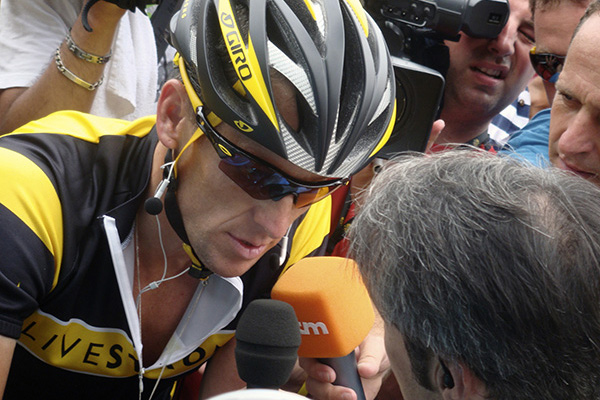
Compared with some of his more attention-hungry contemporaries, documentarian Alex Gibney has always remained resolutely behind the camera, doggedly attempting to prevent his personality from coloring his work. With that in mind, one can only imagine what it must have been like for Gibney to be unwillingly drafted into a story — not just as an observer but as a participant.
Gibney’s latest documentary, “The Armstrong Lie,” began production as a film about Lance Armstrong’s 2009 comeback ride at the Tour de France. When fresh evidence emerged supporting the drug accusations that had dogged Armstrong for years, the film was put on indefinite hiatus.
Only after Armstrong publicly confessed to having used drugs in an interview with Oprah did Gibney retrieve the already shot footage and began to comb through it retrospectively for clues. It is this search that is the meat of the finished film.
Gibney is upfront about all of this, introducing himself at the beginning and narrating the documentary throughout. Though he may be uncomfortable with this more visible role in his film, it demonstrates his willingness to extend the philosophy of thorough research and transparency even to himself.
What emerges is a film about narratives and particularly how the beauty of one narrative can give it precedence over a truer but uglier one. Gibney admits to wanting to believe Armstrong was the real deal and that he could win the 2009 comeback race without the help of drugs.
However, as if more eager than ever to prove his scrupulousness, Gibney presents a fascinating layman’s primer on how bicycle race doping can be done, how it can be hidden from the authorities and even how certain powerful individuals in the cycling community might have been complicit in the cover up of Armstrong’s abuses.
Other elements of the story are perfectly suited to Gibney’s talents as a filmmaker. The sordid underbelly of the cycling world and the secret doping arms race Armstrong joined are precisely the types of subjects Gibney excels in investigating and he goes at it with his characteristic aplomb and attention to detail.
Gibney does not have the same kind of unrivaled access to Armstrong as he did to Eliot Spitzer in the deliciously seedy “Client 9.” He still manages to find enough friends, colleagues and enemies of the former pro cyclist to put together a mosaic portrait of an immensely guarded man who may not even fully understand why he did what he did.
Gibney’s “The Armstrong Lie” may not be the definitive work that some of Gibney’s other films — like “Enron: The Smartest Guys in The Room” or “Taxi to the Dark Side” — were for their respective subjects, but it is nevertheless an excellent account of the Armstrong scandal and a fascinating departure for Gibney.
A version of this article appeared in the Thursday, Nov. 7 print edition. Stefan Melnyk is a senior editor. Email him at [email protected].
























































































































































